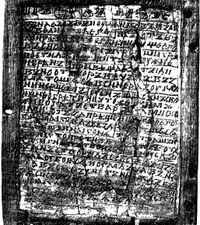Greece: reading of Europe's oldest book investigates ancient religious secrets

More than four decades after the Derveni papyrus was found in a 2,400-year-old nobleman's grave in northern Greece, researchers said Thursday they are close to uncovering new text - through high-tech digital analysis - from the blackened fragments left after the manuscript was burnt on its owner's funeral pyre.
Large sections of the mid-4th century B.C. book - a philosophical treatise on ancient religion - were read years ago, but never officially published.
Now, archaeologist Polyxeni Veleni believes U.S. imaging and scanning techniques used to decipher the Judas Gospel, which portrays Judas not as a sinister betrayer but as Jesus' confidant, will considerably expand and clarify that text.
The scroll, originally several meters of papyrus rolled round two wooden runners, was found half burnt in 1962. It dates to around 340 B.C., during the reign of Philip II of Macedon, father of Alexander the Great.
Anaxagoras, who lived in ancient Athens, is thought to have been the teacher of Socrates and was accused by his contemporaries of atheism.
Last month, experts from Brigham Young University, Utah, used multi-spectral digital analysis to create enhanced pictures of the text, which will be studied by Oxford University papyrologist Dirk Obbink and Pierris, and published by the end of 2007, the AP reports.
Subscribe to Pravda.Ru Telegram channel, Facebook, RSS!


